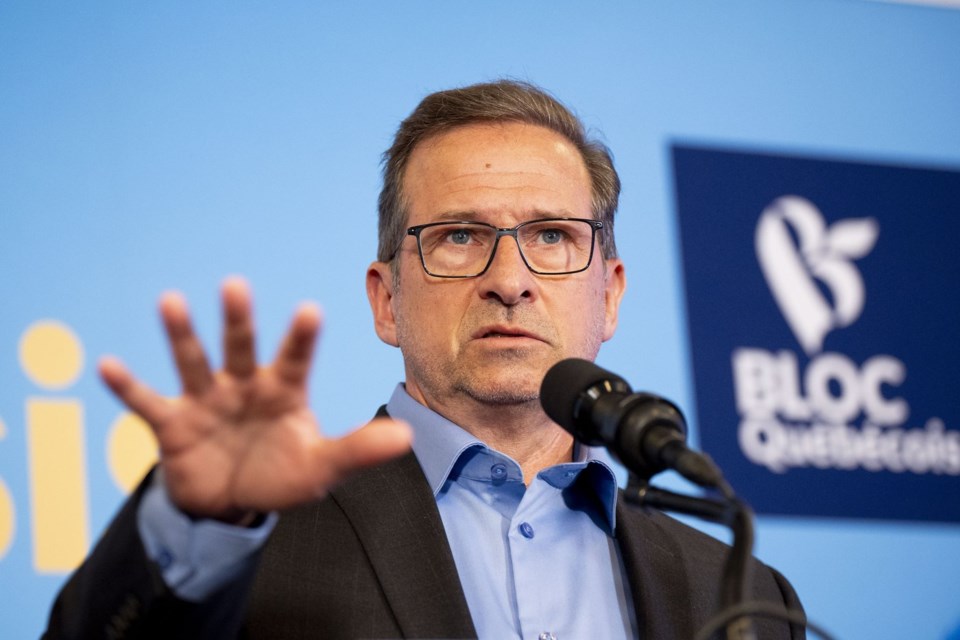MONTREAL — Bloc Québécois Leader Yves-François Blanchet on Tuesday called for a "partisan truce" with other federal party leaders, even as he was accused by the Bloc's provincial cousins of putting the sovereignty question aside.
One day after the federal election, which saw the Bloc's seats reduced considerably, Blanchet told reporters in Montreal that voters want stability in Parliament in order to address the trade war with the United States. He offered to put partisanry aside for a time — as long as the other leaders do the same.
"We will collaborate with them, and they will collaborate with us for the period of the negotiation (with the U.S.)," he said. "It's the result, it's the ask of citizens that there is a kind of alliance between the different parties, the different political orientations."
His comments came shortly before Elections Canada completed the final election tally, with the Bloc Québécois winning 22 seats, less than the 33 it held in the last Parliament. On Tuesday afternoon, the party suffered a blow when the riding of Terrebonne — where the Bloc had been leading by a handful of votes — flipped to the Liberals by 35 votes.
Blanchet blamed the overall result on the U.S. trade war and President Donald Trump's repeated taunts of annexing Canada, threats that created a climate of fear that Prime Minister Mark Carney's Liberals "strategically" used to gain power.
However, he said he was willing to work with Carney, as long as the latter shows respect for Quebec's position on issues such as secularism, immigration and protection of the French language.
Blanchet's olive branch did not go over well with Parti Québécois Leader Paul St-Pierre Plamondon, who criticized the Bloc for treating Carney as a partner and for agreeing to suspend the push for Quebec independence while U.S. trade negotiations take place.
St-Pierre Plamondon said Tuesday he felt limited in speaking out in favour of the Bloc during the election campaign, because of his party's disagreement over Blanchet's strategy. "The strategy adopted by the Bloc, which validates Mark Carney as a partner, as someone who is about to collaborate with Quebec .... that’s not what we think."
The PQ leader described Carney as a threat to Quebec's interests, someone whose party stands for uncontrolled immigration, debt, federal interference in provincial matters and willingness to intervene in Supreme Court cases against laws adopted by the province's legislature.
St-Pierre Plamondon said he'd voted for the Bloc and had hoped the party would hold the balance of power, even as he expressed a wish for it to return to its "sovereigntist roots."
Blanchet said he remains committed to Quebec sovereignty but is convinced the population wants politicians to fix the trade situation first. "What the Quebec and Canadian people want is stability in the federal Parliament. It’s not something very easy to say because those who fought (for the Bloc) for this result want us to go on with independence as soon as possible."
Like Blanchet, Premier François Legault also indicated a willingness to work with Carney, telling reporters on Tuesday that he and the prime minister are “on the same wavelength” on the economy. Legault said he has emphasized to Carney the need to renegotiate Canada’s trade deal with the United States as soon as possible, and urged him not to compromise in areas that matter to Quebec, including supply management of the dairy sector.
The premier said his two major priorities are the economy and immigration, and restated a long-standing request that the federal government reduce by half the number of temporary immigrants in Quebec.
“I think all governments owe something to the citizens voting for them, and I think that the best way to thank Quebecers is to take action about the economy, about immigration,” he said.
Legault also congratulated Blanchet and said he’s counting on the Bloc Québécois, who could hold the balance of power in a minority Parliament, “to defend the interests of Quebec in Ottawa.”
This report by The Canadian Press was first published April 29, 2025.
— With files from Maura Forrest
Morgan Lowrie, The Canadian Press




